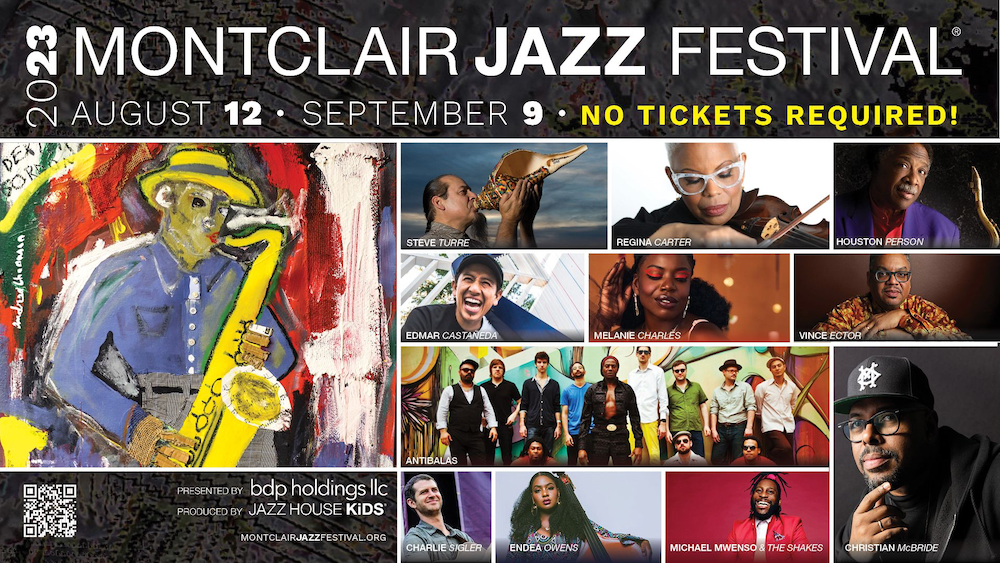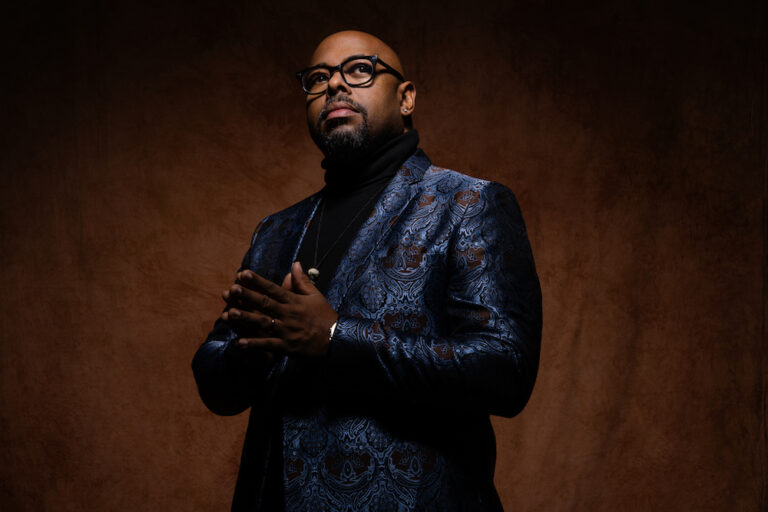The highly anticipated 14th Annual Montclair Jazz Festival has evolved from an end of summer student concert drawing tens of parents to one of the largest jazz festivals in the country. The event is expected to draw 25,000 people to its multiple stages this Saturday, September 9.
At every step of the way, the Montclair husband-and-wife team of bassist Christian McBride and singer Melissa Walker have fostered the growth of both the festival and the non-profit organization that has made an indelible impact on the lives of the next generation of jazz musicians. Jazz House Kids, the producer of Montclair Jazz Festival, is a thriving, nurturing model of encouragement from – and for – young people to take up instruments and explore jazz. The staff serve as both music instructors and mentors who work with students to reach their highest potentials, in music and in life.
Walker founded the program as a sorely needed resource for kids whose school music programs were being eliminated. Walker is also the President of Jazz House Kids, while McBride serves as its Artistic Director.
The 14th Annual Montclair Jazz Festival features a spectacular who’s who of jazz artists including Antibalas, Christian McBride’s New Jawn, Regina Carter, Steve Turre, Melanie Charles, Person to Person with Eric and Houston Person, and the Jazz House All-Stars. The festival runs from 1:00 p.m. to 9:00 p.m. with set times available on the fest’s website.

Montclair is a perfect location for the celebratory day. The vibrant township is known for the many jazz artists who call Montclair home. Jazz musicians also reside in numbers throughout the neighboring region, making this swath of the Garden State fertile, creative ground for a bevy of remarkable artists.
Christian McBride himself is one of these incredible people. He is a fantastic musician and bandleader. Christian McBride’s New Jawn released its new album, Prime, earlier this year. The quartet’s seemless interplay and virtuoso chops are jaw-dropping. The album is both smooth and a rollercoaster ride – many times ll within one song.
The eight-time Grammy Award winner is also a seasoned session musician, having played with a spectrum of legends including James Brown, Paul McCartney, Sting, Pat Matheny, Wynton Marsalis, Chick Corea, Herbie Hancock, Freddie Hubbard, and hundreds of others. We recently had the absolute pleasure of conversing with him.
This year marks the 14th Annual Montclair Jazz Festival. How did the event initially come about?
It was totally accidental. My wife, Melissa Walker, the founder and president of Jazz House Kids, started these summer programs for young students. At the end of the program, we had a concert for all of the kids that participated. So, at the time, we had maybe 30 or 40 students playing in the park and their parents came. The following year we had maybe 40 or 45 students and their parents, and a couple of other people came.
The third year we invited [Renowned jazz pianist] Monty Alexander to come and perform or us. We didn’t even have a piano at the time! We had a little keyboard. We had enough of the community that came out. It wasn’t even a festival; it was just simply an end of the summer school concert. Enough people from the community came out that year that Melissa and I looked at each other and said, “Hey, we might have something here.” The next thing you know it just kept getting bigger and bigger and bigger.
The Montclair Jazz Festival is now one of the most preeminent jazz events in the country. How has the festival evolved?
It helps to live in Montclair because there’s a lot of great musicians in Montclair. You don’t really have to go too far out of the community to create a jazz experience that people will want to see. When we had that first jazz festival… Monty Alexander is not in Montclair, but my drummer at the time had been working with Monty, as well as me, so we thought it might be a nice idea to have Monty come play. Then we invited Joe Lovano and Billy Drummond out. Then someone like Kenny Garrett came, who was just curious enough to come and hang out. We would have people like Billy Hart and Oliver Lake and Steve Turre – who are going to be at the festival this year. We really tried to focus on creating something for the community and we wanted to make it exciting by inviting all of the great musicians who work for Jazz House Kids, as well as musicians who were outside of the community. It’ s really the combination of wanting to do something for the community and to really showcase all the great musicians who are part of our community.
Tell us about the importance of instilling a love of jazz, and all music, in kids.
Well, that’s why Jazz House Kids started in the first place. In 2000, WBGO radio asked Melissa to do a master class for some elementary school kids. As you well know, there’s no crowd tougher in the universe than elementary school kids, and she had to come up with a theme to gain, maintain, and hold their interest. She thought, “What do a bunch five-to-six-year-old kids care about with jazz? What could I tell them what would pique their interest?” She decided to build a metaphorical jazz house using jazz instruments as the tools. The kids really loved it. When she made the floor in the house, it was, “Who is that? Is that the drummer or the bass player?”
It went well and the kids fell in love with her, and she fell in love with the kids. As things usually go in our country, a lot of public schools, particularly in Essex County, started getting rid of their music programs. Melissa put two and two together: “Hey, I can create a non-profit that could fill this void.” That’s how Jazz House Kids got started. When Melissa and I got married and started to do Jazz House Kids together, it was her foresight that seeing an organization like Jazz House Kids was sorely needed in our community.
I am the result of a program like Jazz House Kids. I grew up in Philadelphia and we had the Settlement Music School, which had an afternoon program. Basically, anyone of significance out of Philadelphia in the last 40 years came out of that program. The late Joey DeFrancesco came through there. Kurt Rosenwinkel came through there. Questlove came through there. Not to mention all of the great musicians who come through Philadelphia on tour; they were always very open and very generous with their time when kids came backstage to say hello or ask questions. I always knew if I was in the same position to give back it would be a no brainer It was a perfect storm meeting Melissa and having Jazz House Kids and being dedicated to inspiring younger musicians.
You’ve played sessions with legends like Paul McCartney, Sting, James Brown, and many others. How do you approach studio sessions for various musicians?
It’s a mindset. To me, it’s never really been that difficult. You just have to be willing to learn the aesthetics of any particular type of music. To play bass in Sting’s band all you have to do is go buy a bunch of Sting records. Listen to The Police, listen to how Sting used to play bass in The Police, and listen to how he plays bass for the solo records. As long as you’re willing to learn it’s not that difficult.
The tougher sessions have been playing with musicians from other countries. The styles of American music are not that different, but if you start working with Brazilian musicians or African musicians or Indian musicians, now you’ve got to start getting out of your American comfort zone. I did a recording session with the great Angelique Kidjo and I was the only American in the band. They started playing some of those wet African rhythms and I was holding on by a thread. I got it, but some of those rhythms I was not accustomed to. I’m very grateful that Angelique thought I was the right person for that session, but they started putting some of those rhythms down and I started looking around like, “Uh-oh.” Then I finally figured it out and it was fine. The same thing happened many years ago with the wonderful singer Jeanie Bryson. I was the only American. Most of the musicians were from Central or South America. I’m sitting there in the studio like, “I better get this right.” I love that about certain cultures. When I’m playing with certain Latin musicians there are certain rules to certain grooves that you must adhere to.
If I’m going to play funk with either George Clinton or James Brown, you can’t go in there talking about, “I’m just playing how I feel.” No. You’ve got a certain thing to make this particular style of music work. There’s something about having these structures and parameters and rules. Most of us hate rules, but these rules actually work.
Many people think of improvisation when they think of jazz. Is that always true?
Jazz improvisation is not very different from having a conversation. When people tend to listen to music, they are listening to something that has been meticulously planned and meticulously structured. When you hear jazz, you’re hearing a group of people in a room having an open conversation on a topic they all know about. People tend to think that jazz is just complete improvisation. It’s not complete improvisation. It’s themes and variations based on a particular topic, and that topic of course being melody, or the chord changes. Depending on the group there could be more improvisation, or there could more structure.
Putting together the Montclair Jazz Festival is a tremendous undertaking. What do you reflect upon on after the festival is over? Do you feel exhausted yet exhilarated?
That’s totally it. It always takes a couple of days for it to sink in. I guess it’s been a good thing that fortunately my schedule tends to be where I don’t have a lot of time to reflect. I’ve got to get to the next project. Sometimes I wish I had a little more time to take it all in, but I’ve got to keep it moving.
FOR MORE ON THE JAZZ FESTIVAL HERE IN MONTCLAIR THIS WEEKEND, CLICK HERE! FOR ALL THINGS JAZZ HOUSE, CLICK HERE!



